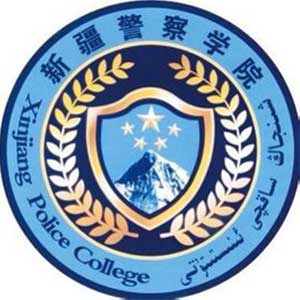Xinjiang Police College is organized by the People's Government of the Autonomous Region, managed by the Public Security Department, and guided by the Education Department. It is the only undergraduate public security college in Northwest China. Its predecessor was the Xinjiang Provincial People's Public Security School established in 1950. In 2002, the Xinjiang Police Officer College was established. In March 2012, the Xinjiang Police College was established with the approval of the Ministry of Education. The college is the "Xinjiang Public Security Police Training Base" and the "Xinjiang Police College Base for Police Practical Training of the Ministry of Public Security". In May 2016, it was added as a bachelor's degree authorization institution. The college insists on serving Xinjiang's public security work, serving Xinjiang's social stability and long-term peace and stability, and serving the overall national security strategy. It firmly grasps the general requirements of loyalty to the party, serving the people, fair law enforcement, and strict discipline, adheres to the "teaching, training, combat and research integration" talent training model, and cultivates "four iron-like" applied public security professionals with all-round development of morality, intelligence, physical fitness, aesthetics, and labor, adapting to the needs of the country's anti-terrorism and stability maintenance struggle, and meeting the requirements of public security work in the new era. The college has two campuses, Changsha Road and Midong, covering an area of 806,300 square meters, with a total construction area of 136,800 square meters and a total construction area of 156,000 square meters under construction. The total value of teaching and scientific research equipment is 28.2258 million yuan, and the library has more than 500,000 books. There are 12 laboratories for network public opinion guidance and control and network attack and defense, 36 training rooms for anti-terrorism VR virtual simulation, 4 open laboratories, 67 open experimental (training) projects, and 30 collaborative education internship and training bases with local public security organs. The college has 83 associate professors or above; 20 doctors, 164 masters; 12 provincial and ministerial level teaching masters, excellent teachers, and teaching experts. Participated in the legislation of the "Xinjiang Uygur Autonomous Region Anti-Extremism Regulations" and the "Xinjiang Uygur Autonomous Region Convenient Police Station Regulations". Won 3 provincial and ministerial teaching achievement awards and completed 23 provincial and ministerial level teaching reform projects. Participated in 2 special research projects on Xinjiang of the National Counter-Terrorism Office, hosted 19 national scientific research projects, 46 provincial and ministerial projects, 47 bureau-level projects, and 67 college-level projects; published 202 academic papers on counter-terrorism; compiled 12 textbooks and training manuals on counter-terrorism; and received instructions from the central and autonomous region leaders to report 4 papers. The college currently has 8 majors and 1 professional direction, including investigation, investigation (Uyghur language), public security, criminal science and technology, network security and law enforcement, police command and tactics, drug control, law, and prison studies, covering the two major categories of law and engineering. The college has established a national postdoctoral mobile research workstation, a national key professional cultivation point for public security higher education, a first-class professional construction point in the autonomous region, a strategic emerging major in the autonomous region, a demonstration major for innovation and entrepreneurship in the autonomous region, an experimental teaching demonstration center for colleges and universities in the autonomous region, a national boutique video open course, and a famous teacher studio for ideological and political theory courses in the autonomous region. Over the past 70 years, the college has trained more than 70,000 applied public security and political law professionals who are loyal to the Party, serve the people, enforce the law impartially, and have strict discipline for the public security and political law organs in Xinjiang. Batches of graduates have inherited the spirit of revolutionary martyrs, passed on the red gene, fought at the forefront of the anti-secession and anti-terrorism struggle, and become the backbone of maintaining social stability and long-term peace in Xinjiang. "People's Hero" Aierti Mamuti, "National Public Security Front First-Class Hero Model" Ma Jianjun, Saierjiang Maimil, Long Fei, Zhao Xinmin, etc., "National Outstanding Communist Party Member" Jiasilati Mahesuti and other heroes and models have emerged, and it is known as the "Cradle of Xinjiang Public Security and Political Law Cadres". Facing the future, the college will adhere to the guidance of Xi Jinping Thought on Socialism with Chinese Characteristics for a New Era, adhere to the socialist direction of running schools, adhere to the fundamental political attributes of "the public security is the party" and "the police academy is the party", follow the laws of higher education teaching, implement the fundamental task of cultivating morality and cultivating people, focus on the overall national security strategy and the needs of border governance, serve the national anti-terrorism strategy, and build an applied public security undergraduate college with "obvious location advantages, distinctive school characteristics, and in line with actual combat needs".
-

Tsinghua University
-

Peking University
-

Fudan University
-

Wuhan University
-

Zhejiang University
-

Nanjing University
-

Sun Yat-sen University
-

Tongji University
-

Renmin University of China
-

Jahrom University of Medical Sciences
-

Mesoamerican University
-

Istmo University
-

Mariano Galvez University of Guatemala
-

Regional University of Guatemala
-

Galileo University
-

Francisco Marroquín University
-

Rafael Landívar University
-

University of the Valley of Guatemala
-

University of San Carlos of Guatemala
-

Technological Institute of Tlaxcala Plateau
-

Golfo University
-

Technological University of South Sonora
-

Technological University of Huejotzingo
-

Tizimín Institute of Technology
-

Chilpancingo Institute of Technology

